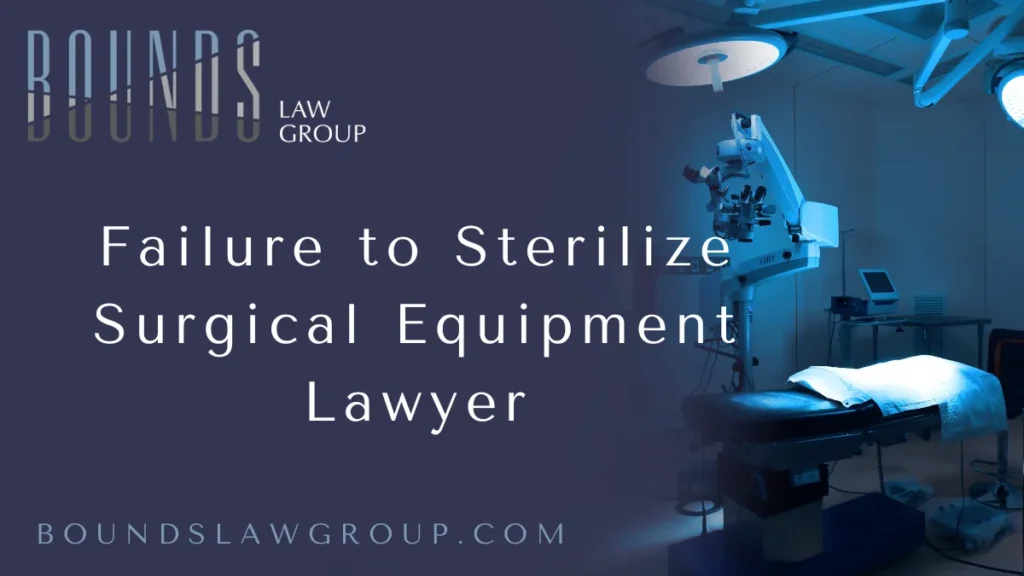
Florida Failure to Sterilize Surgical Equipment Lawyer | Bounds Law Group
When patients undergo surgery, they place their trust in medical professionals to uphold the highest standards of safety and care. However, failure to sterilize surgical equipment can lead to devastating consequences, including severe infections, long-term health complications, and even death. If you or a loved one has suffered due to improperly sterilized medical instruments, Bounds Law Group is here to help. An experienced failure to sterilize surgical equipment lawyer will fight for the justice and compensation you deserve.
Complete our free case evaluation form or call us now at 877-644-5122 to discuss your legal options.
Medical Negligence in Surgical Sterilization
Hospitals and surgical centers must adhere to strict sterilization protocols to prevent the spread of infections. Failure to properly sterilize surgical instruments can introduce bacteria, viruses, and other harmful pathogens into a patient’s body, leading to serious post-surgical infections and complications. This negligence may result from:
- Inadequate sterilization procedures
- Contaminated surgical tools
- Failure to follow hospital sanitation guidelines
- Use of improperly cleaned or reused instruments
- Neglect in monitoring sterilization equipment
If a healthcare provider’s negligence in sterilization has caused harm, you may be entitled to compensation. A failure to sterilize surgical equipment lawyer at Bounds Law Group will investigate your case thoroughly to hold the responsible parties accountable.

Common Infections Caused by Unsterilized Surgical Equipment
Failure to sterilize surgical instruments can expose patients to life-threatening infections, including:
1. Staph and MRSA Infections
Staphylococcus aureus, including its resistant form, MRSA (Methicillin-resistant Staphylococcus aureus), is a common bacteria found in hospitals. It can cause severe bloodstream infections, pneumonia, and sepsis if introduced during surgery.
2. Hepatitis and HIV
Improperly sterilized medical instruments can transmit bloodborne diseases such as Hepatitis B, Hepatitis C, and HIV, leading to lifelong health complications.
3. Fungal and Bacterial Infections
Non-sterile equipment may carry fungal spores and bacteria that result in infections such as endocarditis, osteomyelitis, and surgical site infections (SSIs).
4. Sepsis
One of the most severe complications of infection is sepsis, a life-threatening condition where the body’s response to infection leads to organ failure and death.
If you have suffered from any of these conditions due to medical negligence, contacting a failure to sterilize surgical equipment lawyer is essential to seek justice.
Who is Liable for Surgical Sterilization Negligence?
Medical negligence cases involving unsterilized surgical equipment can hold various parties accountable, including:
- Hospitals and surgical centers for failing to enforce sterilization protocols
- Surgeons and medical staff for neglecting proper sanitization procedures
- Medical device manufacturers if defective sterilization equipment contributed to the negligence
A failure to sterilize surgical equipment lawyer at Bounds Law Group will meticulously investigate the responsible parties to build a strong case for your claim.
Compensation Available in Medical Negligence Cases
Victims of medical negligence may be entitled to compensation for:
- Medical expenses (hospital stays, additional surgeries, medications)
- Lost wages and future earning capacity
- Pain and suffering
- Long-term disability and rehabilitation costs
- Wrongful death damages for families who have lost loved ones
Our legal team at Bounds Law Group will work aggressively to secure the maximum compensation possible for your suffering.
How a Failure to Sterilize Surgical Equipment Lawyer Can Help
1. Case Evaluation and Investigation
Our attorneys will gather medical records, consult with expert witnesses, and review hospital protocols to determine the extent of negligence involved.
2. Filing a Medical Malpractice Lawsuit
We will file a legal claim against the responsible parties and aggressively pursue justice in court if necessary.
3. Negotiating a Fair Settlement
Many medical negligence cases are resolved through settlements. Our attorneys will negotiate with insurance companies to secure the highest possible compensation for you.
4. Taking Your Case to Trial
If a fair settlement cannot be reached, our experienced trial lawyers will represent you in court to fight for the justice you deserve.

Preventative Measures Hospitals Should Take
To prevent the devastating consequences of unsterilized surgical equipment, hospitals and medical facilities should adhere to stringent sterilization protocols, including:
- Strict adherence to CDC and WHO guidelines on sterilization and infection control
- Regular training for medical staff on proper sterilization techniques
- Routine inspections of sterilization equipment to ensure functionality
- Use of advanced sterilization technologies such as autoclaves and chemical sterilants
- Immediate removal of contaminated tools from surgical environments
When hospitals fail to implement these measures, they put patients at significant risk. If you or a loved one suffered due to medical negligence, a failure to sterilize surgical equipment lawyer at Bounds Law Group can help you seek justice.
Contact a Failure to Sterilize Surgical Equipment Lawyer Today
If you or a loved one has been harmed due to unsanitary surgical equipment, Bounds Law Group is ready to help. Our legal team has the expertise and dedication to handle complex medical malpractice cases and fight for your rights.
Complete our free case evaluation form today or call us now at 877-644-5122 to discuss your case.
Sources
- Centers for Disease Control and Prevention (CDC) – Guidelines on surgical sterilization and infection control. Read more
- World Health Organization (WHO) – Best practices for sterilization in healthcare settings. Read more
- American Medical Association (AMA) – Legal perspectives on medical negligence and patient rights. Read more

